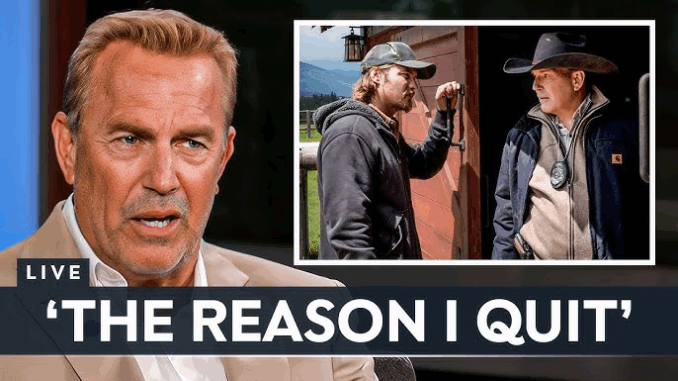
When John Dutton Took a Turn, Even Costner Cried Foul
Yellowstone fans know the show got darker in Season 2—but what you might not know is that Kevin Costner, who plays John Dutton, actually disliked where it was headed. Creator Taylor Sheridan recently revealed Costner didn’t just raise an eyebrow—he raised concerns over the character’s direction. Their behind-the-scenes talks reshaped the show for good.
Season 2’s Dramatic Shift: Morality vs. Might
In its sophomore season, Yellowstone leaned heavily into violence and political scheming. John Dutton’s moral compass seemed fuzzy—he wasn’t just protecting family and land anymore; he was going all-in on ruthless tactics.
That shift triggered an emotional response from Costner, who wanted to preserve Dutton’s core integrity and familial strength.
Costner Speaks Up: “This Isn’t My John Dutton”
Sheridan admitted Costner was visibly frustrated. He felt Dutton was straying from the figurehead patriarch into a morally grey enforcer. Costner didn’t bite his tongue—he expressed his concerns, wanting to protect the emotional heart of the character: family.
Sheridan Responds with Context
Quick on his creative feet, Sheridan likened the show to a Western version of The Godfather. He reminded Costner that when you approach legacy, there’s going to be conflict—even bloodshed. But he listened, and that conversation marked a crucial turning point in the show’s writing.
Season 3: A Course Correction with Memory in Focus
The fallout from that Season 2 conflict? Season 3 brought breathing room. Storylines dialed back on constant violence, focusing more on the Dutton family’s relationships, heritage, and the emotional stakes of owning a ranch. Audiences felt it—Season 3 hit with renewed emotional depth.
Not a Feud, Just a Creative Crossroads
This wasn’t a clash of egos but of storytelling. Both Costner and Sheridan respected each other’s brilliance. They simply had different visions, and talking it out made the show better. There was no shouting match—just passionate, high-stakes artistic debate.
The Ripple Effect: How That Talk Changed the Show’s Arc
Costner’s influence didn’t stop at Season 3. His voice helped shape the balance between showdowns and introspection, between gun-slinging drama and family drama, ultimately helping maintain Yellowstone’s soul even as seasons progressed.
Foreshadowing Costner’s Exit
That Season 2 unhappiness wasn’t just a one-off issue. It reflected growing weariness with violent contest writing, stubborn script delays, and diminishing creative control. Those same tensions contributed to Costner’s eventual decision to leave after Season 5. It all started back with Season 2’s creative crossroads.
What Fans Noticed: The Tone Shift You Felt
If Season 2 felt heavier—more morally ambiguous—now you know why. And if Season 3 felt more emotionally grounded, that was the result of behind-the-scenes bravery: refusing to let the story cross into excess.
More Than Gossip—A Lesson in TV Storytelling
This revelation reminds us that TV shows aren’t manufactured in isolation. They’re shaped by real people, real conversations, creative trust—and yes, real disagreements. It’s the creative friction behind the scenes that makes our favorite storytellers shine on screen.
Conclusion: A Clash That Kept Yellowstone Real
Kevin Costner didn’t just star in Yellowstone—he protected its voice. That Season 2 critique wasn’t a fight—it was a lifeline. And it reminds us that sometimes star power isn’t about flash—it’s about heart, and courage to preserve what matters most.
FAQs
1. Why did Costner dislike Season 2?
He felt John Dutton had strayed too far into violent and morally unclear territory, losing his core as a protector and patriarch.
2. Did the tension cause any fallout between Costner and Sheridan?
No. The two maintained respectful dialogue, and the talk resulted in creative adjustments—no bitterness involved.
3. How did Season 3 change?
It refocused on family, legacy, and emotional stakes, balancing drama with character depth.
4. Did these disagreements influence Costner’s departure?
Yes. They marked the start of bigger creative frustrations that contributed to his eventual exit after Season 5.
5. What’s the bigger takeaway?
Yellowstone’s evolution proves strong storytelling needs conversation. When passion meets purpose, great TV can happen—even in the face of conflict.
